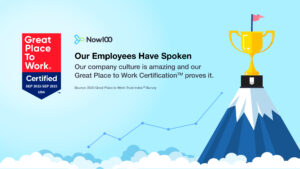
Gen Z comprises 67 million people all over the world. Fascinating, isn’t it?
Even though Gen Z is known as the “young generation”, the oldest of this generation is now 25 years old. They are all grown up. They have entered the corporate world and the workforce.
It is estimated that by the year 2025, Gen Z will make up 25% of the workforce. This statement might sound controversial, but it is a fact that people are now looking up to Gen Z to revolutionize the operations of the workplace.
Those born between 1997-2012 are playing a crucial role in this industrial revolution and will soon take over the workforce by storm. They are setting a trend that will be charted in the next decades. How does this generation plan on influencing the workforce with their approach and vision? Let’s dive in.
The Future of the IT Industry
Recruiters and hiring managers need to understand how this generation grew up. They saw their parents using keypad phones and then experienced the rise of smartphones. They saw the 2008 recession and how their parents struggled. In most recent years, Gen Z navigated the Covid-19 pandemic. They grew up during the boom of social media and navigated the whole world shutting down via the internet. Gen Z has been through and seen much.
The present market needs to modify according to the current generation’s demand. They cannot adhere to the rules and regulations that worked in the early 2000s. Gen Z is looking for something interesting and challenging that aligns with their career path and offers work-life balance. They don’t want to spend hours toiling. They’re faster, smarter, and have a distinctive way of thinking.
So, how can an organization attract Gen Z talent? What can they offer?

- Flexible Work Environment
Gen Z is looking for flexibility. Flexibility doesn’t always pertain to remote work. Gen Z tends to leave or consider leaving a job if their employer doesn’t offer a flexible work policy. Flexibility offers a wide range of meanings. Research shows that out of 4000 Gen Z (age 18 to 25) , 70% prefer a mixture of being in the office and at home or just full work from the office, rather than entirely going remote.
Gen Z has seen enough tumultuous years to value flexibility and adaptability. They’re not flag bearers of old-school thinking anymore. What does this entail for hiring managers and recruiters? Depending on the requirements of the role, it’s preferable to offer flexibility or a hybrid option. It appeals to the candidate to explore the role more compared to Gen X or millennials. A better alternative would be giving the new hire a choice to choose his/her weekly hours as long as the assignment gets done.
Contractual work is also attracting a lot of attention. It gives Gen Z a chance to explore manifold opportunities over the years. With so many possibilities and probabilities, an organization needs to map how they want to progress with their hiring strategy.
Gen Z needs communication to thrive. Working from home can seem enticing at first but soon it’ll lead to burnout. Recruiters should prepare beforehand on how to tackle such situations. Flexibility is one of the most crucial keys to attracting Gen Z talent. It also ensures fair recruiting, equal opportunity for all, and a more inclusive work environment.
- A place of learning and growth
Organizations should offer an opportunity to learn and grow not only as an employee but also as an individual. Before Gen Z joins a company, they wonder how the organization can help them grow.
Give them reason to join the organization. Promote a culture of learning and career enhancement.
Companies should indulge in a mentorship program, give access to learning courses and feature these skills on their website and social media platforms to attract this generation. Gen Z wants to know when and why they would work. A study shows that 76% of Gen Z employees cite learning as the key to a successful career and that 2/5th is willing to accept a pay cut of up to 5% for a role that facilitates better learning opportunities.
- Hire Smarter Hire Better
In recent years, one of the most controversial topics on LinkedIn is how companies require 2-3 years’ worth of experience for an entry-level job role. This thought process and philosophy needs to change.
Hiring a new person with little to no experience can be challenging but it can also be rewarding. Recent grads may not have the desired experience, however, their zeal and enthusiasm to learn something new will help the organization grow positively.
Recruiters should advertise entry-level jobs accurately and hire deserving applicants.
When Gen Z is starting their career, they need someone to take a chance on them. If they see entry-level jobs requiring experience, it can promote a toxic work norm, and make them feel underqualified. Experience requirements may be stopping candidates from applying altogether.
It’s important to focus on skills and willingness to adapt and learn rather than just experience.

- Explore and Grow Digitally
Businesses need to expand their social presence. Recruiters should take advantage of what social media has to offer and hire worthy candidates.
Gen Z has grown up in an environment where they’re familiar with social media and budding technology. Companies should have varied forms of recruitment. Be it video format resume, or directly reaching out to candidates, recruiters should do their research and reach their audience in a way that speaks to them.
As an organization, one of the prime goals should be to get the brand’s message and values out in the world. Talk about meaningful subjects- showcase values, and beliefs, promote cultural diversity, and endorse the brand vision. Utilize social media to spread the message. Gen Z values inclusivity and diversity. They want to be part of an establishment that makes a difference.
- Prioritize Mental Health and Well Being
This generation is aware of how precarious mental health is. Two years of staying at home further exposed this issue. Organizations need to understand the significance of prioritizing mental health.
There should be systems in place to raise awareness and provide employees with the help they need. This not only prevents burnout but also promotes a healthy work environment.
As an organization, list out the beneficial offerings. Highlight these benefits and focus on what sets the company apart. Foster a work culture so encouraging that Gen Z is excited to join. Gen Z is more inclined to join an establishment that understands work-life balance and sets clear expectations and boundaries.
Key Takeaways
Hiring Gen Z can feel like a gamble because of the generational gap as well as different mindsets. However, Gen Z is hardworking. They are the executives of the future. Gen Z will pave the way for the future generation and the way the IT industry is evolving. They challenge themselves and their potential and come up with a solution that hasn’t been considered before.
It is important to attract hard workers and give them something worthwhile.
Gen Z wants to be part of a cause, a company that makes or breaks it, a diverse company, a place where learning opportunities are provided, and a place where they can grow, thrive, and unleash their potential. They are a creative, pragmatic, thought-provoking generation. Other generations might think that their way is the right way, but times have changed. They should also learn to adapt to the new generation. Together, with their knowledge and Gen Z’s innovative thinking, a new world awaits.
Read some of our other works here: https://now100.com/5-powerful-tips-on-how-to-retain-top-talent/





